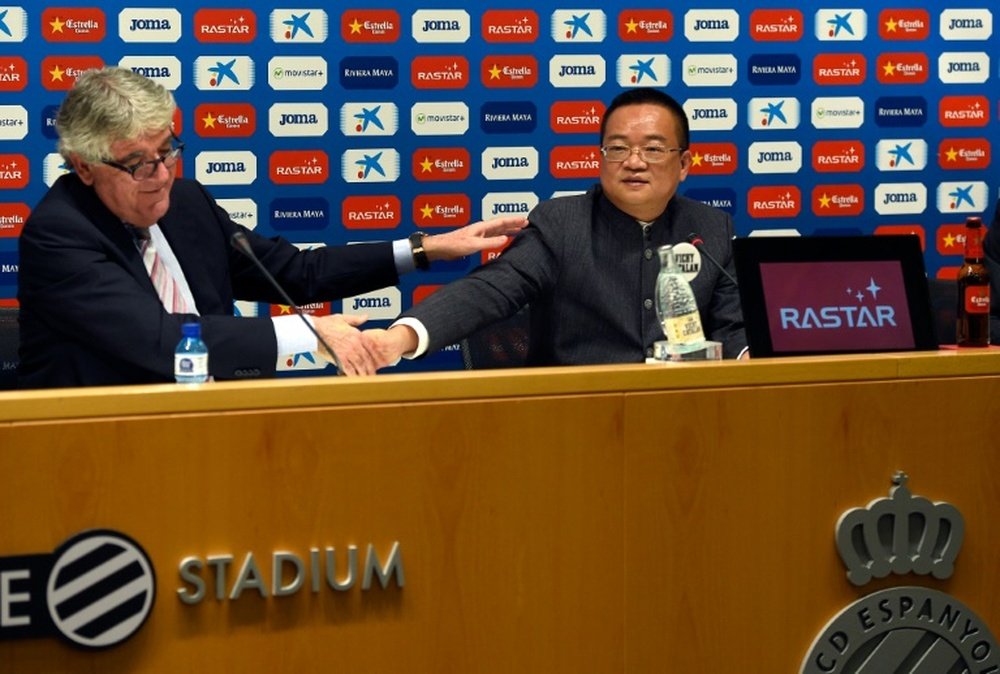Espanyol lead La Liga's push for Chinese investment


Facing perilous debts of 190 million euros ($216 million), Barcelona-based Espanyol were taken over in January with Chinese entertainment company Rastar Group acquiring a 54 percent stake for a 60 million euro investment.
Rastar's is not the only major investment from Asia as Spain's La Liga looks to keep tabs on the financial might of England's Premier League powered by a £5.1 billion television rights deal to take effect from next season.
"That a lot of investors from Asia come to the league for us is very good news for La Liga," Espanyol's CEO Ramon Robert told AFP.
"China has a bigger population than Europe. It means a lot of supporters, it means a lot of consumers and if Chinese investors come here, it means a lot of people will follow the Spanish league which is perfect."
Chinese conglomerate Wanda bought a 20 percent stake in 10-time Spanish champions Atletico Madrid last year before announcing their move into football on the world stage by becoming FIFA's first top level sponsor since the departure of Sepp Blatter as president.
Singaporean businessman Peter Lim's Meriton investments group has plunged over 500 million euros into Valencia since completing a takeover in 2014.
Money has also been piled into the Chinese game domestically with the country's transfer record falling four times during a record 331 million euro splurge during the winter transfer window.
The drive behind the investment lies in President Xi Jinping's interest in football and China's hopes to one day host the World Cup.
"Investing in football is not about securing a financial return. Rather it is about global power, influence and acceptance," says Simon Chadwick, professor of sports enterprise at Salford University and an expert on the rapid rise of the Chinese football industry.
"Many individual entrepreneurs know that European football clubs don't make money. The benefit for them comes in terms of the public message these investments send to the Chinese government.
"Hence, when Chinese entrepreneurs do business in China, they are likely to be viewed more favourably than those that aren't seen to be supporting the football revolution."
La Liga is certainly attempting to make the most of that revolution.
"It isn't a bubble. There is work ongoing to develop and it will grow. It is a very powerful market," La Liga's president Javier Tebas said at a recent Soccerex event analysing the transfer market around the globe.
La Liga sent 36 coaches to work in Chinese football schools in February, whilst Saturday's El Clasico between Barcelona and Real Madrid was screened in 30 cinemas across China with special La Liga organised events held in Shanghai and Beijing.
On the field, Espanyol president Chen Yansheng is hoping to make China's presence felt in Spain as he set an ambitious target of Champions League football within three years for a side more accustomed to languishing in the bottom half of the table.
"The reality is he trusts and we trust we can do it, but only if we build the project step-by-step and in a serious way," adds Robert.
"Espanyol is 116-years old, it is one of the founders of the league, is a club with a great history, but in the last few years the goal was to be in a safe position and not close to the relegation zone. We need to forget about this."
Yet, in contrast to the free-spending approach adopted by the likes of Manchester City and Paris Saint-Germain to establish themselves in the Champions League, Robert insists Espanyol's plan is to build financially stable foundations.
"We can't think we are going to change the whole team. We have to build it with the business plan we have for five years, with clear budgets, incomes and expenses for every year.
"At this stage we are doing every month what we planned. If we continue this way, we know we will arrive at the European positions in three years and would like to be a team that plays every year in Europe."


